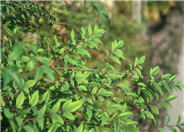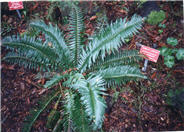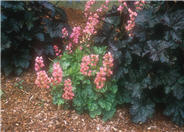
Common name:Japanese Maple
Botanical name:Acer palmatum
This magnificient plant can used as a small tree or shrub. It is deciduous with graceful leaves which have a scarlet color in spring as it leafs out. Leaves later turn orange or yellow in fall. It is slow growing to 20', and requires shelter from the hot sun. The leaves of this tree are small, light green in color, and deeply lobed. It should also be noted that this tree remains spectacular throughout all seasons. (2nd photo courtesy of Steve Mullany)

Common name:Nandina, Heavenly Bamboo
Botanical name:Nandina domestica
Nandina domestica is a graceful upright shrub that grows from 3'-6' in height. It gets its name from its bamboo-like growth habit. When thinned from the center it bears a remarkable resemblance to bamboo. It is best used in groups. It can be used in a shaded patio or out in a shrub border with full sun. An interesting feature of Heavenly Bamboo is the bronze color in the new growth when planted in full sun. It also bears clusters of white flowers in the spring.

Common name:Western Sword Fern, Alaska Fern
Botanical name:Polystichum munitum
This Fern produces upright fronds, reaching 4'-5' tall in moist, cool forests in Northern California. This size is usually lower, especially without summer watering. It is great in containers or dry shade landscapes. This species is especially useful to give the illusion of lush, moist gardens where little water is actually being used. It should receive part shade to dense shade. -Monterey Bay Nursery

Common name:Golden Running Bamboo, Fish Pole Ba
Botanical name:Phyllostachys aurea
This Bamboo will grow to about 25' tall and is drought tolerant with dense foliage. This running bamboo needs to be restricted or confined.

Common name:Coral Bells
Botanical name:Heuchera cultivars
These perennials have wonderful flowers in colors ranging from white to deep crimson. The flowers bloom in spring and these plants are popular in masses or borders.
Designer: Jeff Gamboni Landscape Archite
Photographer: GardenSoft
Physical weed control, including mulching, or hand removal protects the watershed from harmful chemicals.
Mulching and adding compost to soil can minimize evaporation and help soil absorb and store water.
Attract, or buy beneficial insects such as ladybugs and lacewings to control pest outbreaks in your garden.